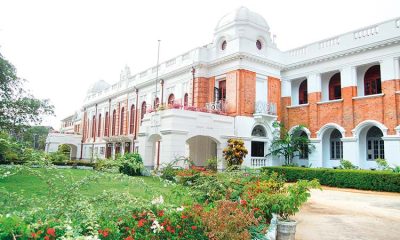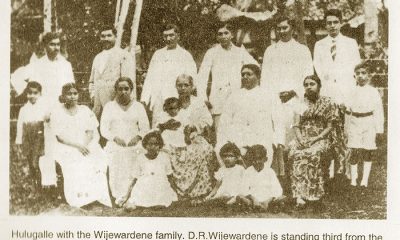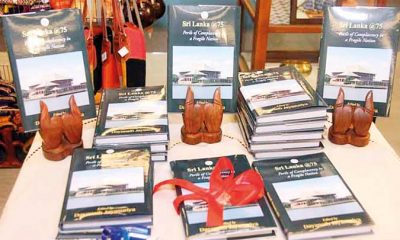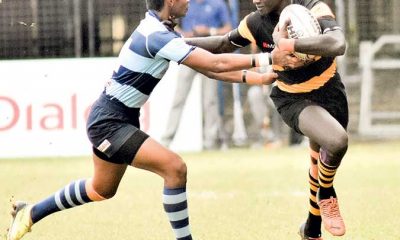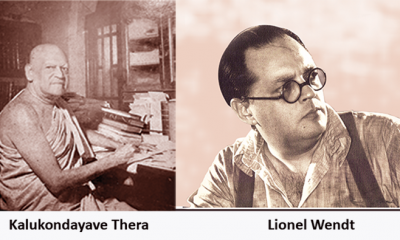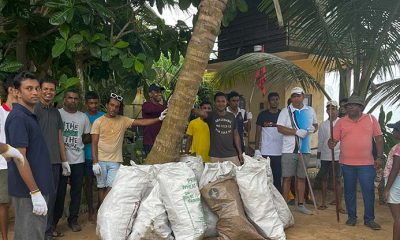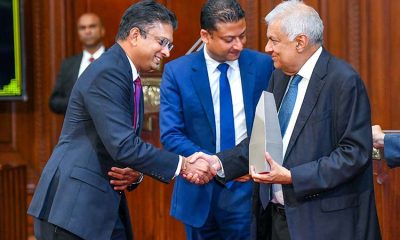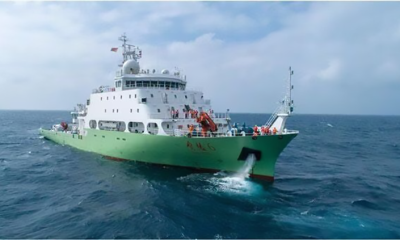Editorial
How we must play the game

We are all familiar with the famous lines of American sportswriter Grantland Rice that “When the Great Scorer comes to mark against your name, he writes not if you won or lost but how you played the game.” Well as far as we Sri Lankans are concerned, we played the game abysmally badly last Sunday when we took on India at the Asia Cup final under overcast conditions at the R. Premadasa Stadium in Colombo.
The lines quoted above, of course, refers to sportsmanship. We were by no means unsporting and have never been so in the international sporting arena. Where we fell flat on our faces was how badly our team played last week to be scuttled out for a mere 50 runs in 15.2 overs to be trounced by 10 wickets.
The records show that this is not our worst ever performance in the white ball game. In 2012, a team that included greats like Mahela Jayawardena, Kumar Sangakkara, Tilakaratne Dilshan and Angelo Mathews was bowled out for a mere 43 runs in 20.1 overs in South Africa. Given that the most recent defeat came days after a nail-biting victory over Pakistan a few days earlier, it was doubly devastating for Lankan fans who paid an unusually high price – not set by us but by Pakistan hosting the tournament – to witness a debacle.
We have to face the fact that our cricket fans are champion cheer leaders when things go right and are quite the reverse when they go wrong as happened in the game against India last week. However, they are not guilty of torching players’ homes as had happened elsewhere. Allegations like match fixing, without a shred of evidence, abounded over the social media and there were demands that Dasun Shanaka who led our team be replaced as captain.
There is no debate that the cricket administration in the country has in recent year sunk to their lowest depths. This is an admitted fact and some halfhearted attempts have been made over the past decades to correct this situation. Gone are the days when people like Robert Senanayake, the younger son of the late Prime Minister D.S. Senanayake, ran the affairs of the then Board of Control of Cricket in then Ceylon (Now Sri Lanka Cricket).
But even then, old timers may remember, when two of the selectors (both good cricketers) picked themselves for the team. Political interventions in cricket have both been for the good like Mr. Gamini Dissanayake winning us the right to play Test cricket and much more and for the bad of which less said the better.
Right now there is very little to be said for the administration and the method of its election. Suffice it be said that Muttiah Muralitharan, our all time great bowler, once said that he could contest any seat in the whole of the country and get elected but it was doubtful that he would get a single vote in a Cricket Board election!
Some on the Interim Boards have been led by unexceptionable people who accepted office not because they hankered for position but because they wanted to do what they could for the game and the country they loved. We’ve had reputed banker, Rienzie Wijetillake, who ran a tight ship and team managers of the calibre of Michael Tissera. There were others like well like Hemaka Amarasuriya and Vijaya Malalasekera. The other side of the coin does not bear examination.
The squad for the 2023 event that will get underway in three weeks’ time is not out yet and we shall know what is to be this time around in a couple of days. On Tuesday, the selectors had met other key stakeholders of the sport and had decided to replace Dasun Shanaka as captain. On Wednesday Dasun visited the High Performance Center at the Premadasa Stadium and had told fellow players that he was quitting. Then he went to Maitland Place for a meeting with the selectors at noon and found that they had made a complete about turn. What prompted the selectors to overturn their original decision? Were there sound cricketing reasons or were they pushed to make the change?
There has been a lot of pressure, inevitably aggravated by out dismal performance on Sunday that the captain, who on his current batting form does not seem to merit a place in the team, must be changed. But as the head coach, Chris Silverwood, said after the recent debacle: “There is much more to being the captain than just scoring runs. Dasun is a very good captain. He is respected by everyone in the dressing room. He understands the players and shows them a lot of love and support and that love and support is returned.”
That’s quite a mouthful. Together with the ground reality that changing the captain at this late stage carries its own considerable downside risk, sensible people will endorse the selectors volte face in going back on their instant reaction to the debacle in the India match. The fans too must realize that lady luck plays a big part in sporting matters. If we had lost the toss and India had chosen to bat as she well might have, events may have rolled in a different direction. However that be, let us give our lads a chance and wish them the very best in India next month. That’s how the game should be played.
Editorial
JVP in NPP’s clothing

Tuesday 30th April, 2024
The JVP-led NPP has come under an avalanche of criticism for a claim made by Nalin Hewage, one of its stalwarts, in a recent television debate, that the victims of the JVP’s reign of terror in the late 1980s were anti-social elements such as rapists, robbers, bootleggers and cattle rustlers. A protest was held near the JVP headquarters, Battaramulla, yesterday, against that controversial claim.
Hewage’s assertion runs counter to JVP/NPP leader Anura Kumara Dissanayake’s recent statement, in Canada, to the effect that he was sorry for the JVP’s violence in the late 1980s. One wonders whether the JVP is remorseful for its terrorism (1987-89) or divided on that score, with the party’s ultra-radical core remaining unremorseful. Is the JVP in the NPP alliance trapped in what may be called the Dr. Jekyll and Mr. Hyde duality? Other political parties planning to contest the upcoming presidential election are out for the JVP’s blood, so to speak, the prominent among being the SJB, the UNP and the SLPP.
The UNP has condemned the JVP for the latter’s mindless violence in the late 1980s. It seems to think the people have forgotten its own Caravan of Death, which left thousands of youth dead. It ran many torture chambers, massacred suspects and buried them in mass graves or burnt them on tyre-pyres on the roadside by way of a warning to others. Most of all, the country would not have been plunged into a bloodbath if the UNP had not falsely accused the JVP of complicity in the 1983 anti-Tamil pogrom and proscribed it. Perhaps, the UNP destroyed more lives than the JVP did during the 1987-89 period. Worse, the UNP, had no qualms about enlisting the JVP’s support to retain its hold on Parliament after falling out with President Maithripala Sirisena in 2018. The ‘Marxist’ JVP unashamedly propped up the beleaguered ‘capitalist’ UNP administration! The SJB leaders were in the UNP government, which benefited from the JVP’s backing. They did not make an issue of the JVP’s ugly past then.
The SLPP is also without a moral right to condemn the JVP for its past violence. Its leader Mahinda Rajapaksa would not have won the 2005 presidential election but for the JVP’s support. It was the JVP which led his propaganda campaign to all intents and purposes and made his victory possible.
The JVP is playing the victim card to gain public sympathy. It says it has become a target of the political elites in the SLPP, the UNP, the SJB, the SLFP, etc., They, it says, have banded together, shedding their differences, to suppress it. This claim is not without a modicum of truth. The leaders of the political parties opposed to the JVP co-operate to safeguard their interests, and that is why none of their leaders have been incarcerated for their crimes despite regime changes. But one disagrees with the JVP on the Marxist markers used in identifying elites. Going along with Vilfredo Pareto’s theory of elites instead, one may argue that the JVP leaders cannot be excluded from the political elites. Examining the structure and change of elites, Pareto has convincingly argued that elites and non-elites are not stable and new elites rise and oust othe old ones, and this change is called the circulation of elites, which has not spared the JVP. Besides, the JVP has earned notoriety for political promiscuity. It has honeymooned with the parties it describes as elitist. In 1970, it backed the SLFP-led United Front, and turned against the newly-formed government the following year. In the late 1970s, it got close to the UNP, whose government released its leaders from prison. Later, it turned on the UNP and met its Waterloo in 1989. In 1994, it backed the SLFP led by Chandrika Bandaranaike Kumaratunga, and subsequently fell out with it. In 2004, it coalesced with the SLFP and had representation in the UPFA Cabinet. The following year it enabled Mahinda to realise his presidential dream. It took on Mahinda later on. In 2015, it honeymooned with the UNP again for about five years. Now, it is on a campaign to vilify the UNP and its leader Ranil Wickremesinghe.
Fear being expressed in some quarters that the JVP is likely to revert to its old ways and suppress political dissent ruthlessly the way it does in universities is not unfounded. Its role in the 2022 protests, especially the abortive march on Parliament, has fuelled the fear that it has not bid farewell to extra-parliamentary methods to capture state power.
The JVP would have the public believe that winning the next presidential election will be a walk in the park for it, but reality is otherwise. It has its work cut out to allay fears in the minds of the public. Having made a colossal blunder at the last presidential election, the people are not likely to vote blindly for any political party or person again. The least the JVP can do to gain public confidence is to tender an unqualified apology for its past crimes and publicly abandon its outdated ideology.
Editorial
Boosting state revenue

Monday 29th April, 2024
The Committee on Public Finance (COPF), headed by SJB MP Dr. Harsha de Silva, is reported to have called upon the government to re-evaluate its tax policies, systems and mechanisms to boost state revenue. It has reportedly explained revenue losses in terms of what has come to be known as the Laffer curve, according to which when tax rates are extremely high, they lead to a decrease in taxed activities such as investment and consumption, causing a drop in state revenue, and when tax rates are too low, they fail to yield sufficient revenue for the state.
The SLPP government, under President Gotabaya Rajapaksa, did away with some taxes and slashed others at the expense of state revenue, but it has, under President Ranil Wickremesinghe, moved to the other extreme. The need is for a via media.
Citing reasons for the drop in state revenue, the COPF has highlighted the Excise Department’s failure to bust the fake revenue sticker racket and collect duties on liquor efficiently. However, impervious to logical reasoning and wise counsel, the government continues to labour under the misconception that jacking up taxes is the only way to boost state revenue although unconscionable tax increases lead to tax avoidance or evasion and promote the growth of the so-called underground economy.
The government does not curtail its wasteful expenditure for state revenue to increase. It has embarked on a campaign to shower handouts on the poor ahead of the upcoming presidential election to compass its political ends despite calls for it to rationalise welfare expenditure and ensure that poor relief is properly targeted. State funds are also wasted on useless government ceremonies and politicians’ junkets. Corruption, which is rampant among government politicians and officials, also causes huge losses to the state coffers, as evident from the Health Ministry procurement scams.
The COPF has expressed serious concern about the inordinate delay in digitalising the excise duty collection process. If the Excise Department as well as other revenue-generating agencies such as the Customs could be rid of various malpractices, which deprive the state coffers of billions of rupees annually, perhaps it may be possible to pass the benefits of revenue increases therefrom on to the public. It is the corrupt who fear and resist digitalisation, which could be considered the most efficacious antidote to corruption, for it engenders transparency.
It is hoped that the government will heed the COPF guidelines for increasing state revenue by preventing losses and eliminating waste instead of burdening the public with more taxes.
Fish or cut bait
The SJB and the JVP-led NPP keep challenging each other to a debate on the current state of the economy and how to revive it. At this rate, one wonders whether the debate will ever take place. The two parties are only wasting their time and energy. Given the appalling nature of parliamentary debates on economic affairs and other such vital issues, it is doubtful whether a debate between two Opposition parties, the SJB and the NPP, will leave the public any the wiser.
If either the SJB or the NPP has an alternative to the government’s economic recovery strategy and really feels for the country, it ought to unveil its silver bullet without further delay. There should be ample time for the economic programmes of the SJB and the NPP to be evaluated properly before the next election so that the public will be able to see if they are feasible.
The upcoming battle for the coveted executive presidency will be fought on the economic front. Having been taken for a ride, the public cannot be unaware that it is a mistake for their political allegiances to take precedence over their concerns about the economy. They are not likely to be swayed by promises and political rhetoric again while reliving hardships, shortages of essentials and winding queues.
If the SJB and the NPP are serious about having a debate on the economy, they should have a discussion, decide on a date and be done with it. Let them be asked to fish or cut bait.
Editorial
Abolishing executive presidency non-issue at present moment

There are many who believe that Mr. Karu Jayasuriya, though not in active politics now, is the best president this country never had. His accomplishments in the political field are too numerous to list and his integrity is widely acknowledged. Given the proximity of the event, people even in this country notorious for their short memories, remember his sterling performance as speaker in October 2018.
That was when then President Maithripala Sirisena, elected to office in 2015 mostly on anti-Mahinda UNP votes, triggered a constitutional crisis by appointing former President Mahinda Rajapaksa as prime minister while Ranil Wickremesinghe held that office and retained a parliamentary majority. The result was two concurrent prime ministers. The wild scenes in parliament then with chillie powder thrown and other missiles flung and the speaker physically restrained from taking his seat cannot be forgotten. Jayasuriya demonstrated guts showing he would not be intimidated by thuggery.
Karu Jayasuriya has assumed the leadership of the National Movement for Social Justice (NMSJ) from Ven. Madulwawe Sobhita Thero who played a major role in fielding Maithripala Sirisena as a common opposition candidate in 2015. Sirisena was committed to abolishing the executive presidency running against then President Mahinda Rajapaksa who, abolishing the constitutional two-term limit on the presidency, unsuccessfully sought a third term for himself. Ven. Sobhitha’s untimely death undoubtedly enabled Sirisena to welsh on his promise of abolishing the executive presidency.
Among those who have recently held that office, Gotabaya Rajapksa, despite the ignominy of the manner of his exit, stands out as the only president who did not promise to abolish that office. Mahinda Rajapaksa did so in 2005. Chandrika Kumaratunga who talked of a bahubootha constitution came closest to getting rid of the office in 2000 but her attempt to retain transitional provisions in a new constitution retaining executive powers for herself until the end of her term resulted in that effort being aborted.
With the presidential election approaching at the end of this year, Karu Jayasuriya has once again brought up the question of abolishing the executive presidency. In a recent statement he said: “The NMSJ has been conducting discussions with social groups across the country. Based on the views expressed in those discussions, it is understandable that there is a widespread opinion among the people that the executive presidency should be abolished. Therefore the prospective candidates in the upcoming presidential election should state their positions regarding the abolition of the presidential system in their election manifestos. Those who promise to abolish it should also state the timeline for fulfilling it.”
With the clock ticking and the election drawing nearer, the matter of the abolition of the executive presidency seems to be a non-issue at this particular moment. Whether it will remain so further down the road or surface once again is an open question. President J.R. Jayewardene was not elected for his first term as president. As is well known, he scored a landslide five sixths parliamentary majority in the 1977 general election under the first-past-the-post Westminster-style election, became prime minister and thereafter created the executive presidency deeming himself the first executive president.
He was elected president for the first time only in October 1982. Thereafter, he extended his massive parliamentary majority for a further term through what is widely perceived, though not conclusively proved, as a rigged referendum. He purportedly obtained the people’s consent for a further term, without an election, for the incumbent parliament to retain his 1977 majority. It has been argued that the concentration of power in an executive presidency enabled the defeat of the LTTE after a near 30-year civil war but these are imponderables that could forever be debated.
Karu Jayasuriya’s NMSJ is not a political party. It is an influential social movement led by a trusted retired politician who has acquitted himself well in various elected and unelected positions including cabinet minister, mayor of Colombo, ambassador to Germany, business leader and, early in his career, a voluntary military officer. Whether NMSJ has the muscle to get the various presidential candidates who will run later this year to declare, with a time-frame, in their manifestos their stance on abolishing the executive presidency is something that remains to be seen.
The aragalaya demanded “system change.” Although it achieved the ouster of the Rajapaksas from the heights of power, there was no system change. What it created was the paradox of Ranil Wickremesinghe, who led the UNP to a zero seat defeat in August 2020 being first appointed prime minister and then president by a president on the run. RW who returned to the legislature on the UNP’s single national list seat, no doubt, has established more than a semblance of normalcy and hopes to be elected president on the back of this performance. Abolishing the executive presidency is not a part of his present agenda although the subject had been perfunctorily discussed.
The incumbent is busy cobbling a broad alliance on the back of which he hopes to be elected. The principal contenders are not likely to include the abolition of the executive presidency in their manifestos whatever NMSJ requests. The top priority of the electorate will be setting the economy right and easing the cost of living. Other things, most voters are likely to feel, can come later.
-

 Business7 days ago
Business7 days agoTelin and Dialog Axiata ink strategic partnership to manage international voice and SMS termination
-

 Business4 days ago
Business4 days agoSri Lanka Resorts of Cinnamon Hotels & Resorts mark Earth Day with impactful eco-initiatives
-

 Business6 days ago
Business6 days agoComBank crowned ‘Best Bank in Sri Lanka’ by Global Finance for 22nd year
-

 Business5 days ago
Business5 days agoUNESCAP Technical Cooperation Highlights Report flags significant strides in its partnership with Sri Lanka
-

 Business5 days ago
Business5 days agoDialog Axiata recognised as the Most Significant FDI Contributor by BOI
-

 Business6 days ago
Business6 days agoCinnamon Lakeside Colombo welcomes Nazoomi Azhar as its new General Manager
-

 News3 days ago
News3 days agoSri Lankan Oil and Gas exploration grinds to a standstill amid protracted legal battle
-

 News3 days ago
News3 days agoGerman research ship allowed Sri Lanka port call after Chinese-protest led clarification


